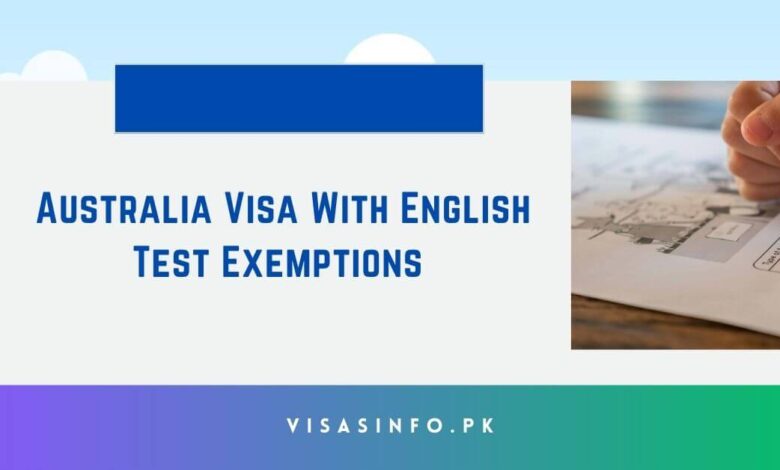Australia Visa With English Test Exemptions in 2024

Australia’s dynamic potential and diverse culture are well-known and specific English language proficiency requirements are in place for certain visa categories. To be able to speak effectively in Australia and make a positive contribution to both society and the position, candidates must meet these requirements.
This update offers an exhaustive guide to assist prospective migrants in comprehending the English language exemptions for Australian visas in 2024.
Overview of English Language Criteria for Various Visa Categories
A diverse array of English language proficiency levels is required by the Australian government. The following English language proficiency examinations are permissible for Australian visa applications.
- International English Language Testing System (IELTS) eligibility is granted to all immigration categories.
- Furthermore, the academic Pearson Test of English (PTE) may be implemented for all Visa categories.
- To qualify for a professional or skilled visa, you must satisfactorily complete the Occupational English Test (OET).
- Lastly, the Advanced Cambridge (C1) exam is open to applicants who hold student or professional visas.
Exemptions and Special Considerations
Applicants should be aware of the numerous exceptions and specifics of the English language proficiency requirements for Australian visas. These exemptions may differ depending on the applicant’s age, country of origin, educational background, and the specific Visa category they are requesting. It may be easier for candidates to ascertain whether they require an English language test if they are cognizant of these exclusions.
Nationality-Based Exemptions
Certain candidates are exempt from the English language competency exam if they possess a passport from an English-speaking country or are proficient in the English language. These countries consist of the United States, Canada, New Zealand, the United Kingdom, and Ireland. As of 2024, passport holders from these countries are frequently regarded as proficient in English, and the majority of visa categories do not necessitate them to submit additional evidence of their language competency.
Age-Related Exemptions
Occasionally, the English language proficiency requirements are influenced by age. For example, candidates may not be required to take the English language competency exam if they are either over or under a set age. This typically pertains to a spouse and their family. Visa classifications
Educational Background Exemptions
Candidates may not be required to take the language exam if they have satisfactorily completed specific levels of English language instruction. For example, the English language requirements are typically satisfied by obtaining a degree certificate or continuing education in an English-speaking country. Studying in South Africa, the United States, Australia, the United Kingdom, Canada, New Zealand, or the Republic of Ireland is permissible with this unique visa. Subclass variables
Unique exemptions or less stringent English language proficiency requirements may apply to specific visa types. The intent requirements for certain employer-sponsored visas may be less stringent than those for regular skilled migration visas. You must verify the precise requirements for the visa subclass you are pursuing.
Partner and Family Visa Considerations
The standards for demonstrating English language proficiency for partner and family visas may differ. In certain circumstances, functional English may be the sole requirement, and the criteria for demonstrating this level of proficiency may differ from those for work permits or student visas.
Benefits of Australia Visa With English Test Exemptions
- Simplified Application Process: The visa application process is simplified by the exemption of English language examinations, which saves time and effort for applicants.
- expense Savings: The visa process is more affordable due to the elimination of the expense of English tests, which can be costly.
- Skilled Migration Accessibility: Applicants with specific professional qualifications or work experience may be eligible for English test exemptions, which facilitates the process of obtaining visas for skilled workers.
- Processing Time: The visa application procedure may be expedited, resulting in faster approvals, as there is no requirement to complete and submit English test results.
- Inclusive for Native English Speakers: The process can be simplified by avoiding superfluous testing, which is particularly beneficial for individuals from countries where English is the primary language.
- Senior Professional Support: Exemptions are available to experienced professionals or those in senior positions who may not have recent academic English test results. This allows them to concentrate on their areas of expertise rather than language testing.
- Enhancement of Global Talent: By providing exemptions, Australia can attract highly qualified professionals from around the world, irrespective of their English test status, thereby improving the country’s global competitiveness.
Health and Humanitarian Considerations
The English language requirements for candidates with specific medical conditions or those applying on humanitarian grounds are assessed on a case-by-case basis. It is imperative to be adequately prepared to succeed in the English language examinations.
Australia Essential Skills PR Pathway 2024
The Skills In-Demand Visa has supplanted the Temporary Skill Shortage Subclass 482 Visa, resulting in a significant transformation of the immigration environment in Australia. A critical component of this new three-tiered structure is the Essential Skills Pathway, which is designed to regulate and enhance the migration process for occupations that are both significant and low-paying.
In this update, we will examine the key features of the Essential Skills Pathways for Australia PR in 2024, as well as the differences between this pathway and the Core Skills pathway.
Check Also: Sportsperson Visa (T2) – New Changes in UK Sports Visa
Essential Skills Pathway
To guarantee fair treatment and resolve persistent labor shortages, it was imperative to improve the immigration system, particularly for lower-paying industries that are at a higher risk of worker exploitation and displacement in Australia. This resulted in the establishment of the Essential Skills Pathway. The objective of this route is to establish more rigorous and protective measures for migrant laborers in specific industries.
Key Features of the Essential Skills Pathway
There are several critical components of the Essential Skills Pathway, including:
- Route-specific and capped: a limited number of migrants will be permitted to travel along the route, which will be customized to accommodate each industry.
- To guarantee rigorous standards and working conditions, this path will be prioritized, which will involve more stringent regulations and minimum requirements.
- Jobs and Skills Australia will be instrumental in monitoring the labor market’s response to this strategy and offering guidance on its efficacy.
The Essential Skills Pathway was developed in partnership with migratory workers, unions, enterprises, and state and local governments. This pathway prioritizes a handful of sectors that are essential to the quality of life of both Australians and immigrants, including the care and support sector.
This sector-specific approach will ensure that the standard of living for both Australians and immigrants is maintained while finding targeted solutions to workforce concerns.
Frequently Asked Questions
-
Can I go to Australia without an English test?
Can I go to Australia to study without IELTS? Yes. Students can study in Australia without taking the IELTS exam. However, students must provide evidence of their English language skills.
-
For an Australian visa, do I need an English test?
For Australian immigration, you may need to speak English. So, to prove this, the Department of Home Affairs can ask you to show that you’ve taken an official language test, such as IELTS.
-
Who is exempt from the English test?
If the applicant is exempt from the requirement if they are aged 65 or over at the date of application. They have a disability (physical or mental condition), which prevents them from meeting the requirement. There are exceptional circumstances that prevent them from meeting the requirement. 03



